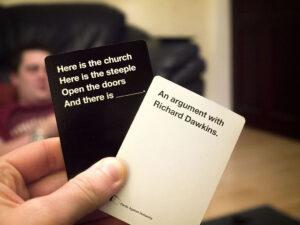
Cards Against Humanity is a party game created by a group of eight friends from Illinois. The game was released in 2011 and is available in both physical and digital formats. Players can purchase the physical card game online, and the digital version is available on their website or through various online platforms like Steam or Google Play. It’s target audience is marketed towards adults who enjoy dark humor and are not easily offended. The game’s messaging emphasizes its “not safe for work” content and suggests that players should have a “twisted sense of humor.” While there is no age limit, the game is not appropriate for children and is recommended for players ages 17 and up. In terms of critical formal elements of the game, the game requires 3+ players. It consists of two types of cards: black cards and white cards. Each round, one player draws a black card, which contains a question or statement with a missing word or phrase. The other players then choose one of their white cards, which contains a word or phrase, to complete the sentence or answer the question on the black card. The player who drew the black card then reads the question or statement and the answers provided by the other players, and chooses the funniest or most absurd answer. The player who provided the chosen answer earns one point, and the game continues with a new round. While the game is very fun and keeps you very engaged for a while, there is one main improvement I can see for the future. Some of the cards were found offensive or exclusionary by friends, because it relies heavily on references to pop culture and current events. To improve the game, the creators could expand the range of topics and cultural references to make it more inclusive and appealing to a wider range of players. For instance, I see a world where the design of the cards and potential answers are not entirely sexual or sarcastic. The game doesn’t necessarily require players to be vulnerable, as the funniest or darkest cards are the ones that usually get chosen. I loved playing the game because it was such a fun way to create a framework to be funny and witty, and also bond with the people in a social setting. Definitely not a game that I would play with a co-worker or in any professional setting.



